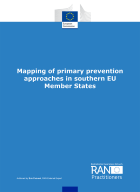Details
- Publication date
- 23 May 2023
- Author
- Directorate-General for Migration and Home Affairs
- RAN Publications Topic
- (Early) prevention
- Community engagement/civil society
- Multi-agency cooperation
- Social cohesion and polarisation
- Vulnerable youth and youth engagement in P/CVE
Description
Globally speaking, primary prevention of radicalisation and violent extremism in southern EU Member States (MSs) (Cyprus, Greece, Italy, Malta, Portugal, Spain) has not attracted a lot of attention compared to other geographical areas, Spain being a notable exception. One reason for this may be that in many EU MSs, prevention and countering of violent extremism (P/CVE) policies and strategies were developed in the 2000s in direct response to dramatic terrorist events and thus conceived as the continuation of counterterrorism, largely driven by security considerations.
Social cohesion approaches were adopted only later, in order to address fundamental long-term issues (discrimination, stigmatisation, citizenship, integration, equality, exclusion, racism, education, etc.). Their development differed between regions and countries. Generally speaking, social cohesion approaches are more visible in the northern and western parts of Europe rather than in the south. However, primary prevention efforts in southern EU MSs have never been systematically reviewed and available academic literature tends to focus either on counterterrorism or targeted prevention efforts.
Still, good, innovative and promising practices can be found across all above-mentioned MSs. Just like other European countries, southern EU MSs are currently confronted with a series of challenges including global warming, the effects of the COVID-19 pandemic and associated measures, the spread of hate speech, conspiracy theories, fake news and transnational right-wing extremism, as well as the effects of the Russian war against Ukraine.
All these conditions feed the breeding ground of radicalisation and violent extremism, regardless of specific national contexts. Primary prevention approaches then become more and more relevant and necessary to address problematic situations before they escalate into violent extremism. And so the time has come to take stock and draw lessons from positive experiences in that field

